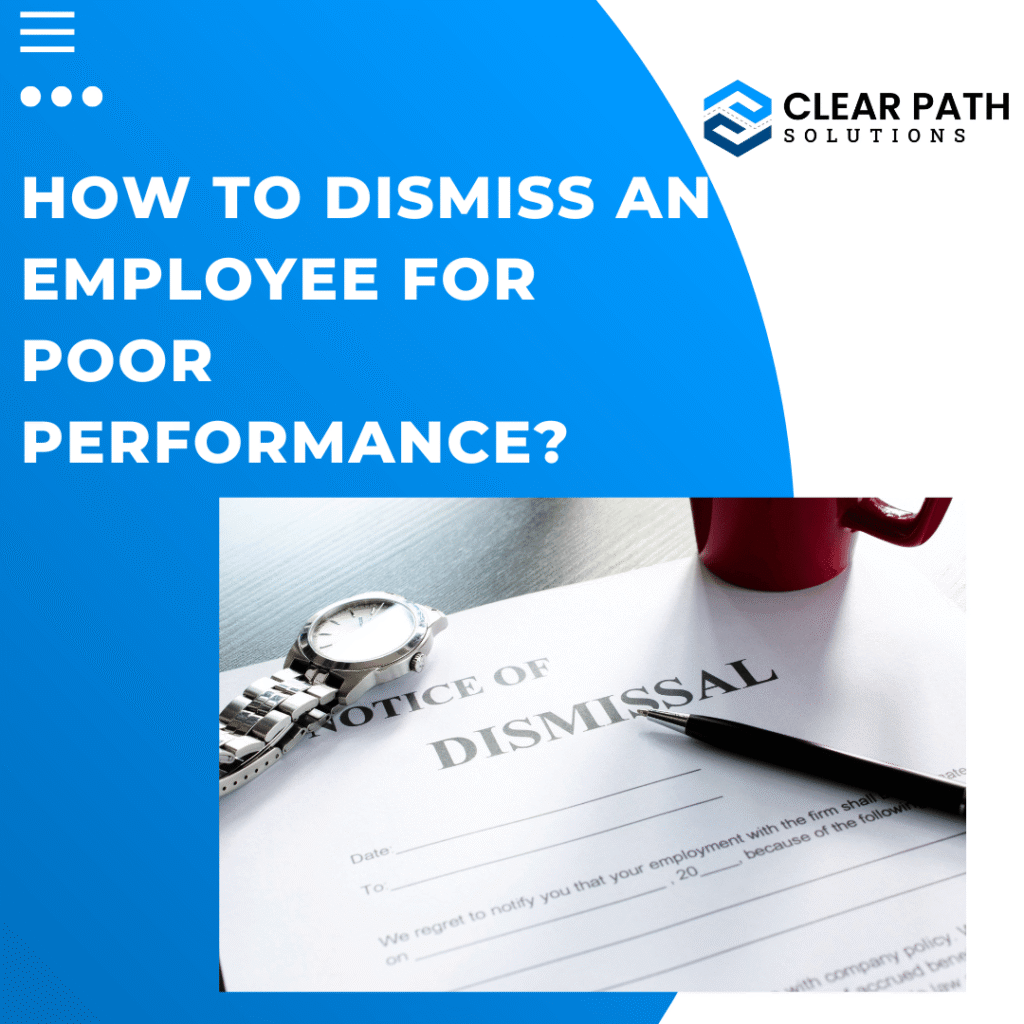Dismissing an employee is never an easy decision, especially when it’s due to poor performance. Though tricky, whenever such situation arises, employers must follow a fair and legally compliant process to avoid claims of unfair dismissal, protect workplace morale, and ensure professionalism. Mishandling the situation can lead to costly employment tribunal claims, reputational damage, and strained team relationships.
In this blog post guide, we’ll take you through important aspects on how to dismiss an employee for poor performance (particularly in context of the UK)—step-by-step—while highlighting legal requirements, best practices, and the importance of a fair approach.
Understanding the Legal Framework
In the UK, an employee with two years’ continuous service has the right to claim unfair dismissal. This means you must have:
- A fair reason for dismissal (poor performance qualifies under “capability”).
- Followed a fair process before making a final decision.
Even for employees with less than two years’ service, it’s always a good practice to follow fair procedures to avoid discrimination claims or breach of contract.
Identify and Document Performance Issues
Before considering dismissal, gather evidence of poor performance, such as:
- Missed deadlines
- Inaccurate or substandard work
- Failure to meet agreed targets
- Customer complaints
- Negative impact on team productivity
Document these issues clearly, including dates, examples, and any impact on the business. Written evidence is crucial in case the dismissal is challenged.
Set Clear Expectations and Provide Feedback
Sometimes poor performance results from unclear expectations.
- Review the employee’s job description and objectives.
- Provide specific feedback on where they are falling short.
- Offer support, such as additional training or resources.
This gives the employee a chance to improve before formal action.
If goals, deadlines, or quality standards are vague, individuals can unintentionally underperform despite their effort. Without clear communication, staff may prioritise the wrong tasks or adopt ineffective approaches.
When expectations are transparent, performance improves, accountability increases, and overall workplace efficiency strengthens.
Implement a Performance Improvement Plan (PIP)
A Performance Improvement Plan (PIP) plays a crucial role in the dismissal process by ensuring fairness, transparency, and compliance with UK employment law.
By outlining expectations in writing, offering necessary support such as training or mentoring, and conducting regular progress reviews, employers demonstrate they have taken reasonable steps to help the employee improve.
This documentation not only supports accountability but also protects the employer legally, showing dismissal is a last resort after due process.
A Performance Improvement Plan (PIP) is a formal document outlining:
- Performance issues identified
- Expected standards
- Support to be provided (training, mentoring, etc.)
- Timeframe for improvement (usually 4–12 weeks)
- Consequences if performance does not improve
Hold regular review meetings during the PIP period to monitor progress.
Ultimately, a well-managed PIP balances employee development with business needs, ensuring any dismissal for poor performance is justified and defensible.
Conduct Formal Review Meetings
If performance does not improve, you may need to begin a formal capability procedure. This typically involves:
- Inviting the employee to a formal meeting – Provide written notice and explain that dismissal is a possible outcome.
- Allowing them to be accompanied – By a colleague or trade union representative.
- Presenting evidence – Share documented performance issues.
- Allowing the employee to respond – They should have the opportunity to explain their side.
These meetings demonstrate transparency, consistency, and adherence to proper procedures, reducing the risk of unfair dismissal claims while supporting a legally defensible decision.
Give a Final Written Warning
If the employee’s performance is still below expectations after a formal review:
- Issue a final written warning.
- Specify the standards they must meet and the consequences of failing to improve.
- Give a reasonable timeframe for improvement.
Warnings should be in writing and kept on file.
Make the Decision to Dismiss
If there’s still no significant improvement despite following all corrective measures, then:
- Invite the employee to a final meeting.
- Explain that dismissal is being considered due to capability/performance issues.
- Allow them a chance to respond before making a decision.
After the meeting, if dismissal is confirmed:
- Provide written notice of dismissal (in line with the contract or statutory minimum notice period).
- State the reason for dismissal clearly as “capability/poor performance.”
- Confirm the right to appeal.
Conduct the Appeal Process
Employees should have the right to appeal the decision.
- Appeals should be handled by someone not previously involved in the case.
- If the appeal is successful, the dismissal can be overturned or alternative actions considered.
Common Mistakes to Avoid
- Employers sometimes face tribunal claims because they:
- Fail to give the employee a chance to improve
- Skip proper documentation
- Act too quickly without following a process
- Give inconsistent reasons for dismissal
- Discriminate (directly or indirectly)
Following the ACAS Code of Practice is key to avoiding these mistakes.
Best Practices for a Fair Dismissal
- Be consistent – Apply the same process for all employees.
- Be transparent – Keep communication open throughout.
- Be supportive – Offer reasonable help for improvement.
- Be thorough – Keep detailed records of meetings and evidence.
Following these best practices for a fair dismissal is vital to ensure legal compliance, maintain transparency, and protect against unfair dismissal claims. It demonstrates professionalism, safeguards the employer’s reputation, and preserves workplace morale.
A fair, structured process also builds trust, showing employees they are treated with respect and dignity.
Legal Risks of Mishandling Poor Performance Dismissals
If you don’t follow a fair process, you risk:
- Unfair dismissal claims (up to £105,707 or a year’s gross salary, whichever is lower – as of 2025).
- Discrimination claims (with uncapped compensation).
- Reputational damage and lower staff morale.
Why Documentation is Your Best Protection?
Every step—from initial feedback to final dismissal—should be documented. This includes:
- Notes of informal discussions
- Copies of PIPs and review meeting notes
- All written warnings
- Signed acknowledgement of receipt from the employee
These evidences can protect you if the dismissal is challenged.
How can Clear Path Solutions help you in Handling such Dismissals?
Dismissing an employee for poor performance can be legally complex and emotionally challenging. As your HR outsourcing partner, we ensure that you follow the correct procedures in line with UK employment law, reducing the risk of unfair dismissal claims.
Our team of experts handle documentation, guide you through capability procedures, prepare formal letters, and advise on employee rights. By having expert HR support, your business organization can duly maintain compliance, protect your reputation, and make confident decisions without costly legal mistakes.
If you’re facing a situation where an employee’s performance isn’t meeting expectations and you’re unsure of the legal process for dismissal, Clear Path Solutions is here to help. Our HR specialists provide expert guidance on capability procedures, ensure you remain compliant with UK employment law, and handle all necessary paperwork, saving you time and stress.
Contact us to help you make the right decision—fairly, legally, and confidently.





